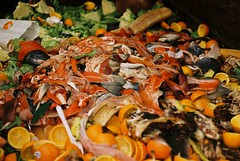- in Gardening , Green Home by Alexis Rodrigo
How to Recycle Your Garden Waste
When garden waste is composted, it decomposes aerobically – that is, using oxygen. Unlike landfills, which decompose waste anaerobically (without oxygen), garden composting produces few greenhouse gases. And when you recycle your garden waste, you are providing yourself with useful, organic compost, thus eliminating the need for synthetic fertilizers.
Here are some ideas for how you can recycle your garden waste.
* Grass clippings can be left on your lawn after mowing.
They will act as mulch, helping to hold in moisture. As the grass clippings rot, they will enrich the soil of your lawn. Rotting grass clippings contain nitrogen, which is an important fertilizer for your yard and garden.
You can also rake up your grass clippings and pile them up where they will rot. You can add bits of this rotting matter to your compost, or even sow seeds into the grass clipping pile. Squash and pumpkins are possibilities for plants that will grow this way, as long as the clipping pile receives enough sunlight.
* Prunings and trimmings from brush, trees, garden plants, etc. can be added to your compost pile.
If they are large or woody pieces, you will need to chop them up a bit before adding them to the pile. If you have a flower garden, compost the pinched-off blooms and cut stems. If you have a vegetable garden, compost peelings, rinds, and leaf and stem prunings.
* Fallen leaves can be piled onto your compost, or composted alone to make something called leaf mold.
This is a kind of compost that is high in nutrients. You can use it for mulch or fertilizer, depending on how you decompose it. Just chopping or shredding leaves produces mulch that you can use immediately, and it will enrich the soil as it breaks down.
To make leaf mold, you must let the leaves rot much longer, from 6 months to 1 year. If you do not chop the leaves first, making leaf mold may take 2 years. Simply compost the leaves in a pile, bin, or other container that allows for ample air circulation and turning.
* Biodegradable bags can be used for yard and garden waste if you have trimmings from weeds or other materials you do not want to recycle.
Some communities will gather garden waste and return it as mulch or fertilizer.
* Creative uses for branches and twigs include home-made herb-drying racks, natural fences, or crafts.
Use natural twine to lash the branches together and reinforce with nails if necessary.
If you liked this post, submit your email address below to get new posts by email:

